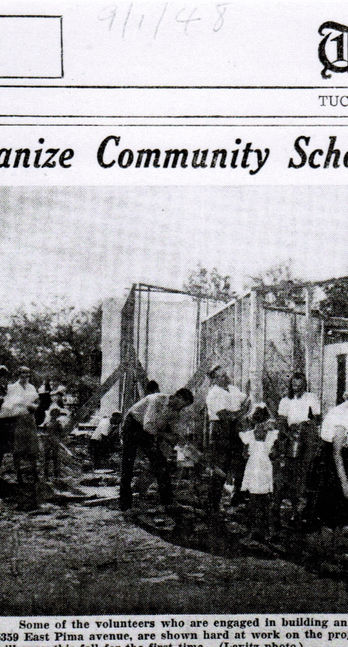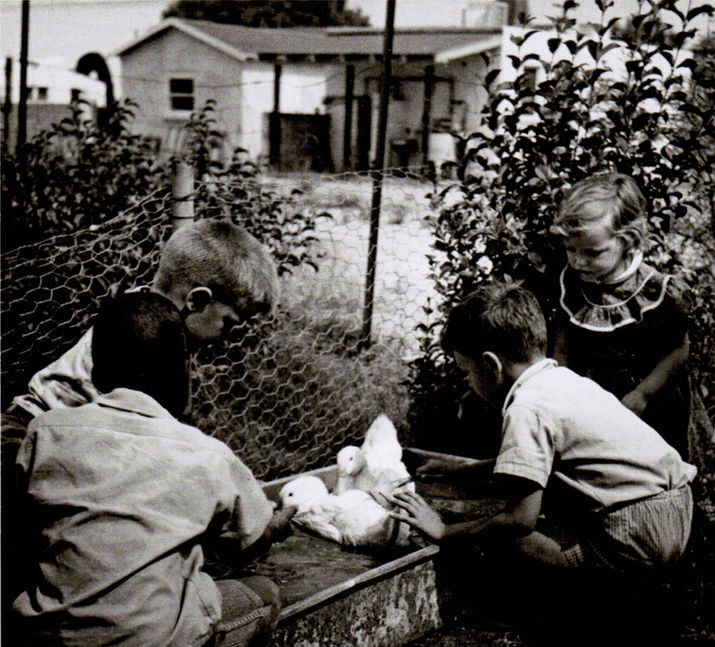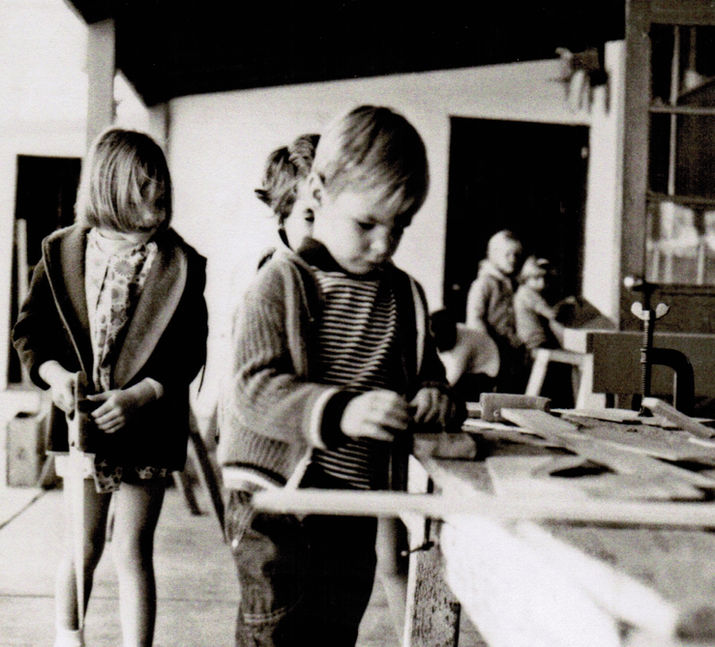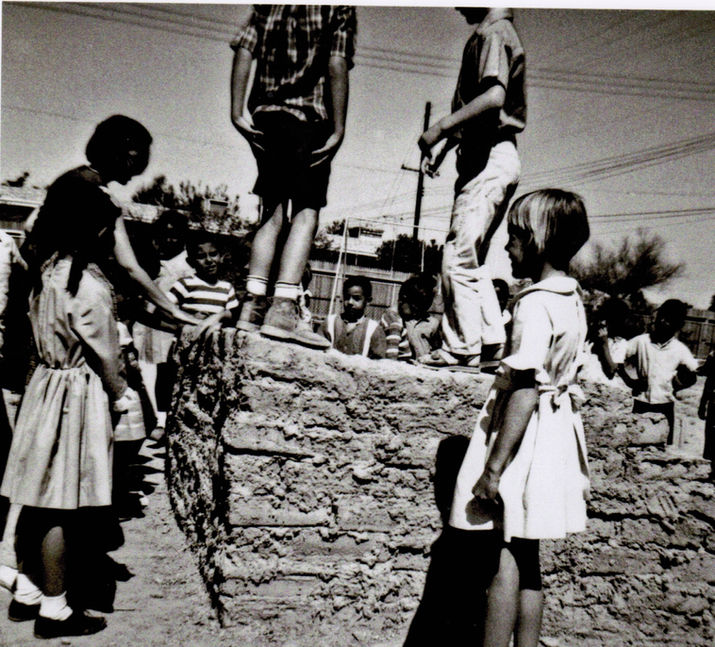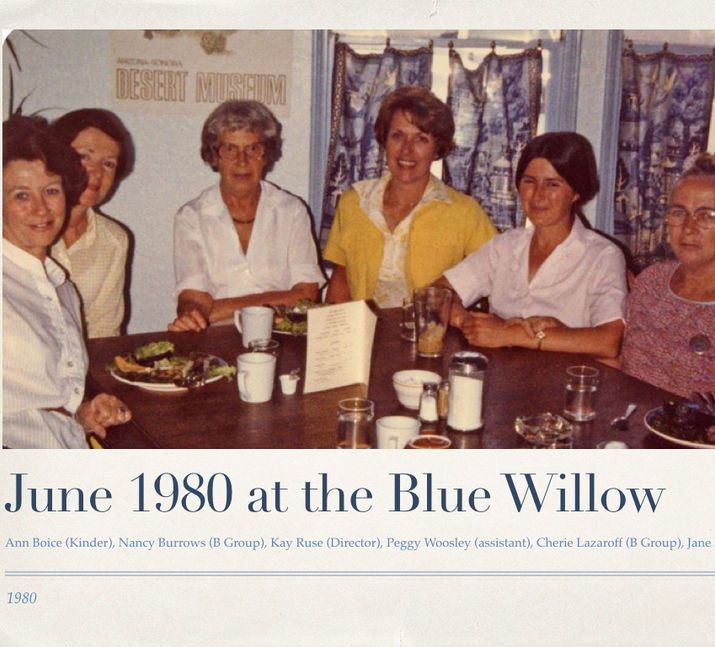Let the Light in: Help us renew our school windows! - Make a Contribution Here.

Our Story
Our Founding
In 1948, TCS was founded by a group of dedicated parents who wanted to actively participate in their child’s education.
After only a year of planning—and without knowing who would head the school or staff it—Ruth Davis and a few other parents, including artists, professors, lawyers, and businesspeople, formed a non-profit school.
Parents threw themselves into adding two rooms to an existing small structure on an acre of desert land. They heeded advice from educators who suggested that they spend their money on hiring teachers rather than a building. And they themselves learned the ins and outs of running a school through hands-on experience.
Our Community
In the midst of the struggle to build and sustain their school, the founders also decided not to discriminate based on race, color, national, or ethnic origin. It would be six more years before the Supreme Court decision on Brown v. Board of Education. Even in 1957, a local newspaper photographer refused to take pictures of black and white students together—to which a board member and parent responded by asserting that TCS' inclusive classrooms were "the way to integration in America!”
Since then, TCS has become more and more of a reflection of the larger community in its diversity, offering scholarships and making it easier for working parents to send their kids to TCS and be part of the TCS community.
Our Educators
The teachers at TCS have always been a key ingredient in maintaining a philosophy of child-centered learning through play, crafts, and limited direct instruction.
The first two teachers, Charlotte Wagner and Barbara Nichols, were recruited from the northeast in the tradition of the Bank Street School. Ms. Wagner had taught at the Little Red School House, and had a wide range of experience as a librarian, teacher, and doing case work. She believed strongly in John Dewey’s idea that “education is a process of living and the school must represent life.” But she did not know exactly what she was in for....
"When I arrived, I was taken out to see this small building in the middle of the desert—it was unfinished. I said, ‘You expect me to turn this into a school?’ It was a tiny shack without a tree anywhere. I was really shocked. And the first time I had to kill a scorpion....
But we were held together by the parents’ dream...They made things happen."
Charlotte Wagner, founding TCS teacher
The atypical climber, which remains a staple of TCS play, was built in 1963.


From the start, there was a channel of communication running directly between parents and Ms. Wagner, as parents made suggestions about field trips and Ms. Wagner explained her teaching philosophies. When Ms. Wagner left to pursue a more lucrative teaching job in the northeast, the school went through some tough times, struggling to find a permanent location and consistent leadership. However, in 1953, the school settled into its current home on Hedrick Drive, where it has remained for seven decades. It was during that time that Terry Goddard, future mayor of Phoenix and Attorney General of Arizona, attended.
During the '50s and '60s, parents were included at staff meetings, continuing the tradition of direct lines of communication between parents and teachers and ensuring that parents too were educated on the school's educational principles. This was also a time of expansion as many families like the Udalls, Goddards, Bahtis, Wrights, Van Slykes, and Eisenbergs began to make names for themselves in the larger community. Authors Byrd Baylor and Ann Nolan Clark were also involved with the school at this time, during which enrollment doubled.
Another influential figure in TCS’s history was Mary Frobisher, who served as director from 1955-1968. She had been a Professor of Education, had many ties to the University of Arizona, and was heavily involved in community-building efforts in Tucson outside of TCS. Her sister, Kay Ruse, who followed her as director, came from Smith College Lab School to teach at TCS in the '50s, and was instrumental in creating a science curriculum. Long before water play was codified in Developmentally Appropriate Practice, she encouraged investigations with water and other raw materials. She taught that "when one enters children's play...one changes it. We won’t know what they can do until we stand back and observe."
As director, Ms. Ruse began the 25-year tradition building an adobe house, as seen below. And it was during her tenure that beloved teacher Cheryl Lazaroff began working at TCS in 1977, retiring in 2017.
Ms. Ruse retired at age 80 in 1988. In 1991, the school received NAEYC accreditation, and many capable individuals have risen to the occasion to fill the roles of teachers, director, and parents. These have included alumnae who either enroll their children or work at TCS.
As new students and parents make TCS a part of their community, the school will continue to evolve and parents will continue to collaborate with teachers and staff at the school, learning from and supporting one another. The 75-year-old roots from which TCS has sprung still require fertilization and renewal of resources to remain vibrant.

